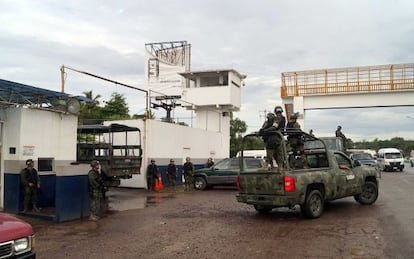Mexican armed forces take control of country's most important port
Last Monday the Mexican army took control of this port located in the state of Michoacan

When it was built 35 years ago the Port of Lázaro Cárdenas on the Pacific Ocean was destined to become the commercial heart of Michoacan. "Morelia, the capital of the state, never had control over the area. The federal government developed it," a well-known Mexican researcher said. Although the construction of the port came after his time, it was General Lázaro Cárdenas, president of Mexico between 1934 and 1940, who created the city to build an iron and steel business in the region.
This week the administration of President Peña Nieto has said that for eight years the city had become occupied territory. Lázaro Cárdenas is considered "the most important port in terms of capacity, the second most important in terms of traffic and the third for foreign trade operations in Mexico." Due to its strategic value, the drug cartels -first La La Familia Michoacan and then Los Caballeros Templarios or Knights Templar- seized control of the area in order to facilitate the transport of drugs such as cocaine from the south and methamphetamine coming from Asia.
According to the daily, Milenio, the cartels in Lázaro Cárdenas combine their drug dealing with "money laundering through legal enterprises" as diverse as acquisition and sale of furniture, trade in livestock and apparel.
"Everyone knew what was happening there including the Center for Research and National Security," the analyst said. "For many years nothing was done. The situation was just left to run its course." Last Monday, the army entered Lázaro Cárdenas, disarmed 113 municipal police officers and took control of the area.
"The intervention had been talked about for months," the researcher said. The operation uncovered an enormous extortion scheme with fees reaching as high as 10 percent of the total value of some businesses. "What's surprising is the fact that the discovery of this illegal activity should happen overnight. It's something that's been coming along for many years, for all three decades since the port opened and gave people hope that this area could see some development," Ricardo Rocha, a journalist at El Universal said.
Still, extortion is commonplace in Tierra Caliente, where the Knights Templar rule. The residents in this part of country, which includes the states of Michoacan y Guerrero, subsist primarily on cattle and the cultivation of a few fruit crops, especially lemon. Its orography makes transportation difficult and the hills have become a perfect hiding place for cartels.
In February more than 30 towns took up arms. The so-called self-defense groups or civilians who decide to take law and order into their own hands in light of the abuse they suffer from organized crime organizations. On October 26, they marched to Apatzingán, a city of almost 100,000 residents and the largest in the region, in a campaign to oust the criminals. Violence erupted in the town square, marking the first armed clashes in Michoacan. Grenades were thrown and shots fired. Those events led to the current operation in Lázaro Cárdenas.
"It was a reactive measure," said Alejandro Hope, a researcher. "It's good but it's not enough. It doesn't dismantle the Knights Templar. It just makes their work more difficult. It also does not address the problem of vigilante groups or the political crisis in the region."
Governor Fausto Vallejo has just returned to his duties after five months on sick leave though the nature of his illness has not been disclosed.
"The Port of Lázaro Cárdenas is fundamental in our foreign trade," the government has said. Shipments through the port include imports and exports of minerals, food crops, automobiles and fluids from and to Asian and Latin American countries. "Its customs office has great strategic value for tax and revenue interests. This year there have already been 91,296 foreign trade operations. Imports reach 121,825 million pesos or 9,205 million dollars. Exports total about 43,182 million pesos or 3,263 million dollars." According the president's office, the port hosts operations for 41 private and public entities every day. Given its importance it's hard to understand how this port in a country ranked 14 on the list of the richest nations in the Organisation for Economic Co-operation and Developmentcould have been taken hostage for nearly a decade without intervention.
"There was complicity," Hope said. "The local authorities folded before the criminals and members of the state government and federal agencies were complicit due to intimidation or corruption. For example, Customs never finished its purge."
The family of the former Michoacan governor, Leonel Godoy, is from Lázaro Cárdenas. His half brother, Julio César Godoy Toscano, is a fugitive from the law after being accused of ties to the drug trade. He was president of this municipality in 2009. That same year he was appointed congressman -something that could not have happened had his brother, the governor, not been from the same party, the left-wing Party of the Democratic Revolution.
Luisa María Calderón is a senator, a member of the National Action Party, former gubernatorial candidate for Michoacan and the sister of the former president, Felipe Calderón. In an interview in EL PAÍS she pointed out ties between politicians and organized crime leaders. "The mayor is the cousin of Chayo [Nazario Moreno González, former head of the La Familia Michoacana cartel, assumed dead since 2010]," she said. "The Treasurer was the wife of Chango [José de Jesús Méndez Vargas, ringer of La Familia]. And there they are in their homes with weapon stockpiles hidden and more than enough gasoline."
On Wednesday the federal police announced the arrest of Leopoldo Jaime Valladares, brother of José Guadalupe Jaime Valladares, former interim president of the city of Apatzingán. He has been accused of illegal possession of arms reserved exclusively for use by members of the armed forces, extortion auto theft. An ongoing investigation will determine whether he was behind attacks on the electric system in October that left thousands without power.
Meanwhile, the federal government has said it plans to stay in Lázaro Cárdenas "indefinitely." "Whether this operation is effective or not will depend on how long it lasts and what exactly it ends up doing," Hope said. "We should ask ourselves 'what will happen afterwards?,' 'how will the criminals evolve and adapt?' "
Translation: Dyane Jean François
Tu suscripción se está usando en otro dispositivo
¿Quieres añadir otro usuario a tu suscripción?
Si continúas leyendo en este dispositivo, no se podrá leer en el otro.
FlechaTu suscripción se está usando en otro dispositivo y solo puedes acceder a EL PAÍS desde un dispositivo a la vez.
Si quieres compartir tu cuenta, cambia tu suscripción a la modalidad Premium, así podrás añadir otro usuario. Cada uno accederá con su propia cuenta de email, lo que os permitirá personalizar vuestra experiencia en EL PAÍS.
¿Tienes una suscripción de empresa? Accede aquí para contratar más cuentas.
En el caso de no saber quién está usando tu cuenta, te recomendamos cambiar tu contraseña aquí.
Si decides continuar compartiendo tu cuenta, este mensaje se mostrará en tu dispositivo y en el de la otra persona que está usando tu cuenta de forma indefinida, afectando a tu experiencia de lectura. Puedes consultar aquí los términos y condiciones de la suscripción digital.









































